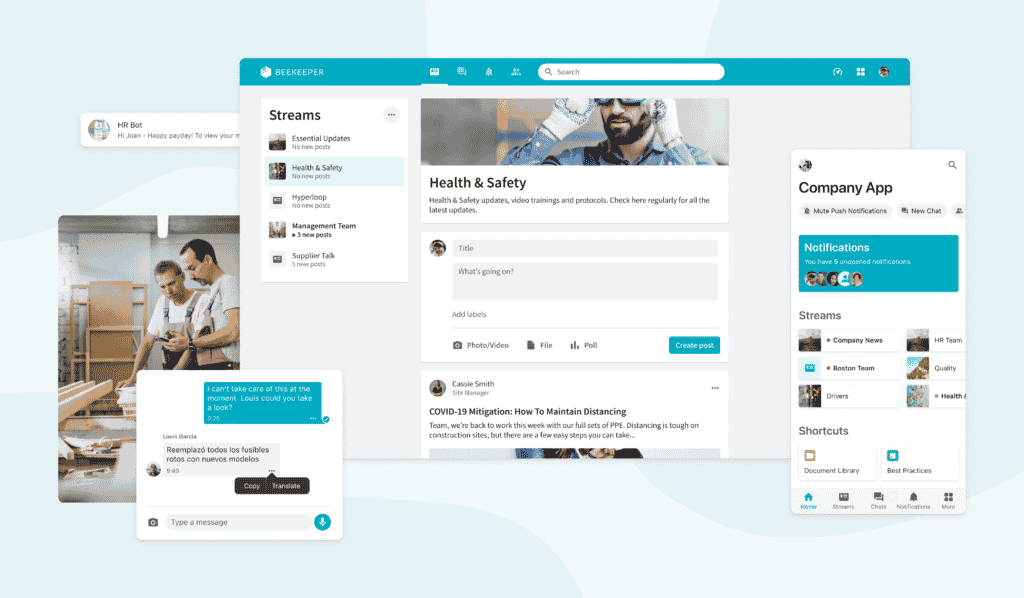You’ve probably heard the word ‘compliance’ floating around the office, but on the manufacturing floor, it’s been at the forefront of the workday since day one. Manufacturing compliance is essential to making sure companies are meeting the operational standards expected of them, so they can continue doing business and serving customers.
As a pillar of standard business operations, companies should already know the compliance protocols for their industry. It’s a good idea to have a well thought out plan in place to make sure the business and its employees are always on top of regulation changes.
Additionally, having the ability to quickly communicate regulation changes around health and safety to employees is a must-have for manufacturing companies operating in a post-COVID-19 world.
Let’s take a deep dive into manufacturing compliance, including what is compliance in manufacturing, why it matters, and how to implement your own manufacturing corporate compliance plan.
What Is Compliance in Manufacturing?

Compliance is something all businesses are tasked with, but what is compliance in manufacturing exactly?
There are two types of compliance: regulatory and corporate.
“Regulatory compliance is when a business follows state, federal, and international laws and regulations relevant to its operations. The specific requirements can vary, depending largely on the industry and type of business.”
“Corporate compliance covers both internal policies and procedures, as well as federal and state laws.”
The way we see it is that regulatory compliance is following the rules and regulations set forth by the governments and industry groups in which your company operates. Corporate compliance is ensuring your company is lawfully operating within both the external regulations and the internal regulations set forth by the company itself.
For global organizations, it’s essential to be familiar and in compliance with the regulatory agencies in the countries you operate in. For example, what might be a standard health and safety procedure in the U.S. may not be permitted in your manufacturing sites in China.
The main areas of compliance in manufacturing are:
- Anti-corruption
- Data Protection
- Employment Law
- Export Controls
- Fair Competition
- Health, Safety, and Environment
- IT Safety and Security
- Product Safety
How Do You Get A Certificate of Manufacturing Compliance?
When organizing your business to comply with regulations, many companies will take the step of earning a certificate of manufacturing compliance for a particular regulatory or industry agency. The certification demonstrates the company’s commitment to upholding compliance guidelines that the agency established.
For example, a standard certificate of manufacturing compliance for the agriculture and food manufacturing industry is for Good Manufacturing Practice (GMP) requirements. According to SGS, the certification, “ensures the integrity of your food manufacturing process as well as your compliance with food safety regulations.”
Additionally, companies can earn their certifications in standards for practices set by HACCP and International Organization for Standards, such as:
- Energy Management (ISO 5001)
- Environmental Management (ISO 14000 family)
- Food Safety (ISO 22000)
- Health and Safety (ISO 45001)
- IT Safety (ISO/IEC 27001)
- Quality Management (ISO 9000 family)
Why Is Manufacturing Compliance Important?

At the heart of it, manufacturing compliance adds a layer of protection over your business. It also protects your employees, customers, communities, and other relevant stakeholder groups by enabling your company to operate in a well-regarded and safe way.
If your company isn’t in compliance, it exposes itself to several risks, including:
- Business Risks: A company or certain operations can be put on pause to correct compliance gaps, which can disrupt the normal course of doing business with customers.
- Financial Risks: Organizations could see negative financial impacts from a compliance breach, particularly if production slows or the customer cancels orders as a result.
- Legal Risks: Businesses open themselves up to unwanted legal action when operating outside of regulatory compliance guidelines, which can also ramp up those financial risks with legal fees and fines.
- Reputational Risks: Compliance breaches can cause significant damage to a company’s reputation by way of losing employees, customers, and investors’ trust.
What Are the Benefits of Manufacturing Compliance?
At first glance, being a compliant organization seems like it’s A LOT of work. This begs the question:
What’s the value that manufacturing compliance brings to a business?
Benefits of a solid manufacturing compliance program include:
- Reduced risk for the company by ensuring a safe environment for employees and quality products and procedures for customers.
- Improved organizational communication where employees have the autonomy to communicate compliance issues with upper management and vice versa when there’s a regulation change.
- Employees are better equipped to do their jobs by providing the baseline knowledge of how things should or should not be run (which can also unintendedly spur employee innovation as well).
- Reduced financial costs that may have resulted from legal fees and fines if the company operated out of compliance
- More trust with all stakeholder groups, including customers, and supports a positive reputation when things are running smoothly.
6 Steps to Implement a Manufacturing Corporate Compliance Plan

Ready to get started in putting together your manufacturing compliance plan?
Here are six steps that can help get your compliance program up and running.
1. Start With Research

The first step in starting your manufacturing corporate compliance plan and the ongoing program is to fully understand the legal and industry regulatory agencies that your company should be following. Keep in mind these agencies can change based on the industry and geographical locations you operate in.
Pro tip: Common regulatory agencies for the manufacturing industry include OSHA, HACCP, FDA, EPA, and International Standards (ISO 9001 and ISO 13845), among others.
2. Establish Oversight and Goals

Next, identify who will champion the manufacturing compliance plan. Typically, companies appoint a Chief Compliance Officer (CCO) to spearhead organizational compliance efforts, which is further supported by a broader cross-functional compliance team.
Once your team is in place, set goals for your corporate compliance program and get started with creating necessary internal documents, such as policies, procedure outlines, and a code of conduct, if not already adopted. These documents may need to be updated once you complete a full risk assessment.
3. Understand Your Risks

When starting your program from scratch, complete a risk assessment within your organization and manufacturing sites to know where your holes are.
4. Take Action

Following the risk assessment, take the appropriate actions to address any vulnerable areas that risk keeping the company from complying with their relevant agencies. Sometimes that can be a quick fix, or a full process revamp.
5. Provide Manufacturing Compliance Training to Employees

Employees are an essential factor in making sure compliance measures are consistently met, which is why providing manufacturing compliance training and integrating the importance of compliance into your company culture is crucial to the success of your compliance program.
Pro tip: Have employees go through compliance training on an annual basis. Regulations can change frequently, so regular training helps employees keep up with current standards to ensure they are always taking the right steps.
In employee training, provide the necessary documentation for each level, so employees have something to refer to if they ever find themselves needing to address something that is no longer in compliance. Employee communication technology, like Beekeeper, helps keep that documentation all in one place for employees to access no matter where they are on the factory floor.
6. Make Compliance an Ongoing Effort

The final step in implementing a manufacturing compliance plan is arguably the most important.
Creating a successful program is an ongoing effort to remain in compliance with regulatory agencies and your company’s guidelines.
These ongoing efforts should include:
- Staying up to date on changes your regulatory and industry agencies issue
- Communicating compliance changes in an effective way that reaches your employees
- Doing regular risk assessments and taking the appropriate actions
- Conducting annual employee compliance training
Manufacturing Compliance in a Post-COVID-19 Environment

In a matter of months, the global pandemic impacted nearly every single business around the world. Now, as the global manufacturing industry navigates the lasting impact of COVID-19, remaining in compliance with evolving health and safety regulations will be key for its recovery.
One way to ensure factory employees are updated on safety regulation changes and crisis communications in real-time is by implementing a mobile employee communication app that delivers information straight to the frontlines.
As the manufacturing industry continues to digitize its equipment and operations in the face of Industry 4.0, many companies are turning to Beekeeper’s employee apps to:
- Communicate important company news quickly
- Provide a centralized place for documentation and information
- Stay compliant with new health and safety protocols, like IRP Meat and Seafood Co.
- Establish a two-way communication method between employees and managers
- Engage employees, both active and furloughed, and increase productivity
- Track their internal communication efforts with real-time data and an analytics dashboard
Are you ready to digitally transform your communications with your frontline employees? Download our white paper “Digitization of the Frontline Workforce” today!
Most Frequently Asked Questions
There are two types of compliance: regulatory and corporate.
Regulatory compliance is when a business follows state, federal, and international laws and regulations relevant to its operations. The specific requirements can vary, depending largely on the industry and type of business.
Corporate compliance covers both internal policies and procedures, as well as federal and state laws.
1. Reduced risk for the company
2. Improved organizational communication
3. Employees are better equipped
4. Reduced financial costs
5. More trust





